News and Reporting
News and Reporting is a section of Christianity Today that compiles the most urgent and interesting news from around the world that you need to know.
News in this category: 30
Bookmark and share this category:
News
Study: 24 percent of clergy in North Carolina are still opposed to same-sex marriage.
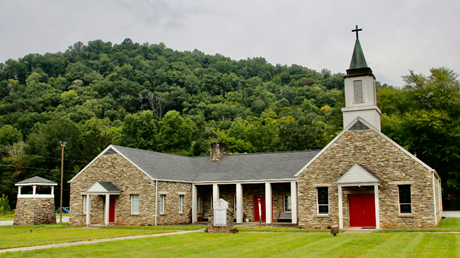 After the departure of thousands of traditionalist United Methodist churches from the denomination over the past five years, it might stand to reason that those congregations remaining in the fold are more progressive and open to ordination and marriage of people in same-sex relationships.But the picture is far more mixed.A new report from the Religion and Social Change Lab at Duke University that looked at disaffiliating clergy from North Carolina’s two United Methodist conferences or regions found that even after the departures, 24 percent of North Carolina clergy remaining in the denomination disagree with allowing LGBTQ people to get married or ordained within the denomination.“At least some amount of ambivalence over LGBTQ+ issues among UMC clergy is likely to persist for years to come,” the report concluded.After a four-year COVID-19 delay and the departure of about 7,600 churches—a loss of 25 percent of all its US congregations—the denomination is likely to reconsider the issue of human sexuality when it convenes its top legislative body April 23–May 3 in Charlotte, North Carolina.Given that the denomination is a worldwide body, with hundreds of delegates from Africa and the Philippines, areas far more conservative in their views of human sexuality, it’s unclear whether the measures stand a chance of passing, even as the US delegation is far more open to such changes.Overall, the Duke report finds that disaffiliating North Carolina clergy were much more politically and theologically conservative than those who chose to remain. Some 85 percent of clergy who left the denomination disagreed with the notion that “all religious leadership positions should be open to people ...Continue reading... After the departure of thousands of traditionalist United Methodist churches from the denomination over the past five years, it might stand to reason that those congregations remaining in the fold are more progressive and open to ordination and marriage of people in same-sex relationships.But the picture is far more mixed.A new report from the Religion and Social Change Lab at Duke University that looked at disaffiliating clergy from North Carolina’s two United Methodist conferences or regions found that even after the departures, 24 percent of North Carolina clergy remaining in the denomination disagree with allowing LGBTQ people to get married or ordained within the denomination.“At least some amount of ambivalence over LGBTQ+ issues among UMC clergy is likely to persist for years to come,” the report concluded.After a four-year COVID-19 delay and the departure of about 7,600 churches—a loss of 25 percent of all its US congregations—the denomination is likely to reconsider the issue of human sexuality when it convenes its top legislative body April 23–May 3 in Charlotte, North Carolina.Given that the denomination is a worldwide body, with hundreds of delegates from Africa and the Philippines, areas far more conservative in their views of human sexuality, it’s unclear whether the measures stand a chance of passing, even as the US delegation is far more open to such changes.Overall, the Duke report finds that disaffiliating North Carolina clergy were much more politically and theologically conservative than those who chose to remain. Some 85 percent of clergy who left the denomination disagreed with the notion that “all religious leadership positions should be open to people ...Continue reading... |
Study: 24 percent of clergy in North Carolina are still opposed to same-sex marriage.
 After the departure of thousands of traditionalist United Methodist churches from the denomination over the past five years, it might stand to reason that those congregations remaining in the fold are more progressive and open to ordination and marriage of people in same-sex relationships.But the picture is far more mixed.A new report from the Religion and Social Change Lab at Duke University that looked at disaffiliating clergy from North Carolina’s two United Methodist conferences or regions found that even after the departures, 24 percent of North Carolina clergy remaining in the denomination disagree with allowing LGBTQ people to get married or ordained within the denomination.“At least some amount of ambivalence over LGBTQ+ issues among UMC clergy is likely to persist for years to come,” the report concluded.After a four-year COVID-19 delay and the departure of about 7,600 churches—a loss of 25 percent of all its US congregations—the denomination is likely to reconsider the issue of human sexuality when it convenes its top legislative body April 23–May 3 in Charlotte, North Carolina.Given that the denomination is a worldwide body, with hundreds of delegates from Africa and the Philippines, areas far more conservative in their views of human sexuality, it’s unclear whether the measures stand a chance of passing, even as the US delegation is far more open to such changes.Overall, the Duke report finds that disaffiliating North Carolina clergy were much more politically and theologically conservative than those who chose to remain. Some 85 percent of clergy who left the denomination disagreed with the notion that “all religious leadership positions should be open to people ...Continue reading... After the departure of thousands of traditionalist United Methodist churches from the denomination over the past five years, it might stand to reason that those congregations remaining in the fold are more progressive and open to ordination and marriage of people in same-sex relationships.But the picture is far more mixed.A new report from the Religion and Social Change Lab at Duke University that looked at disaffiliating clergy from North Carolina’s two United Methodist conferences or regions found that even after the departures, 24 percent of North Carolina clergy remaining in the denomination disagree with allowing LGBTQ people to get married or ordained within the denomination.“At least some amount of ambivalence over LGBTQ+ issues among UMC clergy is likely to persist for years to come,” the report concluded.After a four-year COVID-19 delay and the departure of about 7,600 churches—a loss of 25 percent of all its US congregations—the denomination is likely to reconsider the issue of human sexuality when it convenes its top legislative body April 23–May 3 in Charlotte, North Carolina.Given that the denomination is a worldwide body, with hundreds of delegates from Africa and the Philippines, areas far more conservative in their views of human sexuality, it’s unclear whether the measures stand a chance of passing, even as the US delegation is far more open to such changes.Overall, the Duke report finds that disaffiliating North Carolina clergy were much more politically and theologically conservative than those who chose to remain. Some 85 percent of clergy who left the denomination disagreed with the notion that “all religious leadership positions should be open to people ...Continue reading... |
Interview with leader of new evangelical alliance describes his escape from Khartoum and the pressure to pick a side.
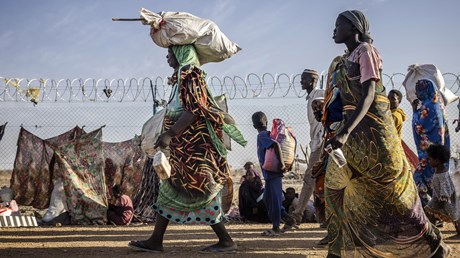 Overlooked by crises in Gaza and Ukraine, Sudan has now endured one year of civil war. Nearly 16,000 people have been killed, with 8.2 million fleeing from their homes—including 4 million children. Both figures are global highs for internal displacement.The United Nations stated that the “world’s worst hunger crisis” is looming, warning that one-third of Sudan’s 49 million people suffer acute food insecurity and 222,000 children could die of starvation within weeks. Yet an international emergency response plan, endorsed by UN agencies including the Cindy McCain-led World Food Program, is only six percent funded.Sudanese Christians feel like “no one cares.”Five years earlier, they had great hope. In 2019 a popular revolution overthrew longtime dictator Omar al-Bashir, wanted for war crimes against his people. The new civilian government repealed the law of apostasy, removed Islamist elements from the bureaucracy, and implemented other democratic reforms. But in 2021 the general of the army, in cooperation with the leader of the Rapid Support Forces (RSF)—a government-aligned paramilitary group accused of the atrocities in Darfur—deposed the prime minister.Continuing negotiations with civilian leaders demanded a merger of the two armed forces, but neither general could agree on terms. And while it is not clear who fired the first shot, last year on April 15 the conflict exploded in the capital of Khartoum. Much of the North African nation is now a war zone.Yet somehow, an evangelical alliance has formed and joined two regional bodies.Rafat Samir, secretary general of the Sudan Evangelical Alliance, witnessed the outbreak of violence firsthand. Now ...Continue reading... Overlooked by crises in Gaza and Ukraine, Sudan has now endured one year of civil war. Nearly 16,000 people have been killed, with 8.2 million fleeing from their homes—including 4 million children. Both figures are global highs for internal displacement.The United Nations stated that the “world’s worst hunger crisis” is looming, warning that one-third of Sudan’s 49 million people suffer acute food insecurity and 222,000 children could die of starvation within weeks. Yet an international emergency response plan, endorsed by UN agencies including the Cindy McCain-led World Food Program, is only six percent funded.Sudanese Christians feel like “no one cares.”Five years earlier, they had great hope. In 2019 a popular revolution overthrew longtime dictator Omar al-Bashir, wanted for war crimes against his people. The new civilian government repealed the law of apostasy, removed Islamist elements from the bureaucracy, and implemented other democratic reforms. But in 2021 the general of the army, in cooperation with the leader of the Rapid Support Forces (RSF)—a government-aligned paramilitary group accused of the atrocities in Darfur—deposed the prime minister.Continuing negotiations with civilian leaders demanded a merger of the two armed forces, but neither general could agree on terms. And while it is not clear who fired the first shot, last year on April 15 the conflict exploded in the capital of Khartoum. Much of the North African nation is now a war zone.Yet somehow, an evangelical alliance has formed and joined two regional bodies.Rafat Samir, secretary general of the Sudan Evangelical Alliance, witnessed the outbreak of violence firsthand. Now ...Continue reading... |
Interview with leader of new evangelical alliance describes his escape from Khartoum and the pressure to pick a side.
 Overlooked by crises in Gaza and Ukraine, Sudan has now endured one year of civil war. Nearly 16,000 people have been killed, with 8.2 million fleeing from their homes—including 4 million children. Both figures are global highs for internal displacement.The United Nations stated that the “world’s worst hunger crisis” is looming, warning that one-third of Sudan’s 49 million people suffer acute food insecurity and 222,000 children could die of starvation within weeks. Yet an international emergency response plan, endorsed by UN agencies including the Cindy McCain-led World Food Program, is only six percent funded.Sudanese Christians feel like “no one cares.”Five years earlier, they had great hope. In 2019 a popular revolution overthrew longtime dictator Omar al-Bashir, wanted for war crimes against his people. The new civilian government repealed the law of apostasy, removed Islamist elements from the bureaucracy, and implemented other democratic reforms. But in 2021 the general of the army, in cooperation with the leader of the Rapid Support Forces (RSF)—a government-aligned paramilitary group accused of the atrocities in Darfur—deposed the prime minister.Continuing negotiations with civilian leaders demanded a merger of the two armed forces, but neither general could agree on terms. And while it is not clear who fired the first shot, last year on April 15 the conflict exploded in the capital of Khartoum. Much of the North African nation is now a war zone.Yet somehow, an evangelical alliance has formed and joined two regional bodies.Rafat Samir, secretary general of the Sudan Evangelical Alliance, witnessed the outbreak of violence firsthand. Now ...Continue reading... Overlooked by crises in Gaza and Ukraine, Sudan has now endured one year of civil war. Nearly 16,000 people have been killed, with 8.2 million fleeing from their homes—including 4 million children. Both figures are global highs for internal displacement.The United Nations stated that the “world’s worst hunger crisis” is looming, warning that one-third of Sudan’s 49 million people suffer acute food insecurity and 222,000 children could die of starvation within weeks. Yet an international emergency response plan, endorsed by UN agencies including the Cindy McCain-led World Food Program, is only six percent funded.Sudanese Christians feel like “no one cares.”Five years earlier, they had great hope. In 2019 a popular revolution overthrew longtime dictator Omar al-Bashir, wanted for war crimes against his people. The new civilian government repealed the law of apostasy, removed Islamist elements from the bureaucracy, and implemented other democratic reforms. But in 2021 the general of the army, in cooperation with the leader of the Rapid Support Forces (RSF)—a government-aligned paramilitary group accused of the atrocities in Darfur—deposed the prime minister.Continuing negotiations with civilian leaders demanded a merger of the two armed forces, but neither general could agree on terms. And while it is not clear who fired the first shot, last year on April 15 the conflict exploded in the capital of Khartoum. Much of the North African nation is now a war zone.Yet somehow, an evangelical alliance has formed and joined two regional bodies.Rafat Samir, secretary general of the Sudan Evangelical Alliance, witnessed the outbreak of violence firsthand. Now ...Continue reading... |
The American Solidarity Party is a small but growing alternative to the Trump-Biden race.
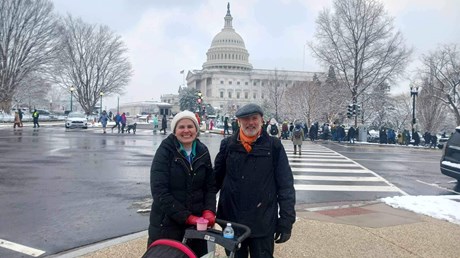 Charlie Richert would really like to stop voting for his dad.But in the last couple presidential election cycles, the 30-year-old attorney in Indianapolis has been unable to square his conscience with picking either the Republican or Democratic party nominee, so he’s resorted to writing in a name.“There’s no way I can escape having my faith inform how I vote,” said Richert, a nondenominational Christian who grew up Republican. “Unfortunately, we’ve been kind of stuck in a doom loop of candidates at the presidential level that I’ve just not felt comfortable voting for.”This year, he’s not drawn to alternatives like Robert F. Kennedy Jr. or Cornel West. “Maybe I’ll write in Abe Lincoln this year. Sorry to my dad, but a new name to write in would be fun,” he said.He recalls seeking to convince his classmates in an eighth-grade mock election that they should support Mitt Romney, but his chagrin with the Republican Party’s presidential nominee tracked with the ascension of Donald Trump.In a year when both major party presidential candidates are viewed unfavorably by a quarter of Americans, many find themselves less excited about the two options at the top of the ticket. But, like Richert, that doesn’t mean they’re ready to go for third-party options.The third-party candidates running in 2024 span the ideological spectrum, from independents Kennedy and Princeton University professor Cornel West to Green Party candidate Jill Stein. Then there are the more obscure party or candidate options—the Prohibition Party, Andrew Yang’s Forward Party, Maryland politician Jason Palmer, and that man in Texas who changed his name to “Literally ...Continue reading... Charlie Richert would really like to stop voting for his dad.But in the last couple presidential election cycles, the 30-year-old attorney in Indianapolis has been unable to square his conscience with picking either the Republican or Democratic party nominee, so he’s resorted to writing in a name.“There’s no way I can escape having my faith inform how I vote,” said Richert, a nondenominational Christian who grew up Republican. “Unfortunately, we’ve been kind of stuck in a doom loop of candidates at the presidential level that I’ve just not felt comfortable voting for.”This year, he’s not drawn to alternatives like Robert F. Kennedy Jr. or Cornel West. “Maybe I’ll write in Abe Lincoln this year. Sorry to my dad, but a new name to write in would be fun,” he said.He recalls seeking to convince his classmates in an eighth-grade mock election that they should support Mitt Romney, but his chagrin with the Republican Party’s presidential nominee tracked with the ascension of Donald Trump.In a year when both major party presidential candidates are viewed unfavorably by a quarter of Americans, many find themselves less excited about the two options at the top of the ticket. But, like Richert, that doesn’t mean they’re ready to go for third-party options.The third-party candidates running in 2024 span the ideological spectrum, from independents Kennedy and Princeton University professor Cornel West to Green Party candidate Jill Stein. Then there are the more obscure party or candidate options—the Prohibition Party, Andrew Yang’s Forward Party, Maryland politician Jason Palmer, and that man in Texas who changed his name to “Literally ...Continue reading... |
Seminary leaders say that the country, where Baptists are the largest Protestant denomination, has lost hundreds of churches in the war with Russia.
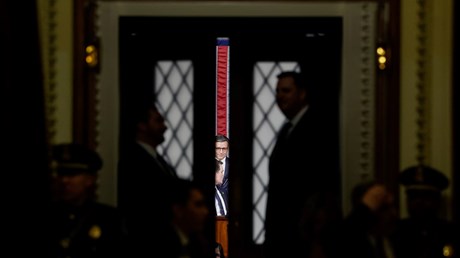 Southern Baptist leaders have written to US House Speaker Mike Johnson, a member and former official of their denomination, urging him to support Ukraine in Russia’s war against its Eastern European neighbor.“As you consider efforts to support Ukraine, we humbly ask that you consider the plight of Christians,” wrote the leaders, who either have ties to the SBC’s Southwestern Baptist Theological Seminary or to Ukrainian Baptists. “The Russian government’s decision to invade Ukraine and to target Baptists and other evangelical Christians in Ukraine has been a tragic hallmark of the war.”The letter, sent Monday, was signed by Daniel Darling, director of the seminary’s Land Center for Cultural Engagement; Richard Land, the namesake of the center and a former president of the Southern Baptist Convention’s Ethics and Religious Liberty Commission (ERLC); Yaroslav Pyzh, president of Ukrainian Baptist Theological Seminary; and Valerii Antoniu, president of the Baptist Union of Ukraine.Johnson is a former trustee of the ERLC, serving when Land—who also is a former commissioner of the US Commission on International Religious Freedom—was its president.In February, the Senate passed a $95 billion package for funding Ukraine, Israel and other allies, with $60 billion earmarked for Ukraine. But Johnson, whose tenure as House speaker may rely on his handling of the bill, has yet to schedule a House vote on the funding measure.Conservatives in the House who oppose funding for Ukraine on “America First” grounds, led by US Rep. Marjorie Taylor Greene of Georgia, have threatened to trigger a vote to remove Johnson from office.“Speaker Johnson has a really difficult ...Continue reading... Southern Baptist leaders have written to US House Speaker Mike Johnson, a member and former official of their denomination, urging him to support Ukraine in Russia’s war against its Eastern European neighbor.“As you consider efforts to support Ukraine, we humbly ask that you consider the plight of Christians,” wrote the leaders, who either have ties to the SBC’s Southwestern Baptist Theological Seminary or to Ukrainian Baptists. “The Russian government’s decision to invade Ukraine and to target Baptists and other evangelical Christians in Ukraine has been a tragic hallmark of the war.”The letter, sent Monday, was signed by Daniel Darling, director of the seminary’s Land Center for Cultural Engagement; Richard Land, the namesake of the center and a former president of the Southern Baptist Convention’s Ethics and Religious Liberty Commission (ERLC); Yaroslav Pyzh, president of Ukrainian Baptist Theological Seminary; and Valerii Antoniu, president of the Baptist Union of Ukraine.Johnson is a former trustee of the ERLC, serving when Land—who also is a former commissioner of the US Commission on International Religious Freedom—was its president.In February, the Senate passed a $95 billion package for funding Ukraine, Israel and other allies, with $60 billion earmarked for Ukraine. But Johnson, whose tenure as House speaker may rely on his handling of the bill, has yet to schedule a House vote on the funding measure.Conservatives in the House who oppose funding for Ukraine on “America First” grounds, led by US Rep. Marjorie Taylor Greene of Georgia, have threatened to trigger a vote to remove Johnson from office.“Speaker Johnson has a really difficult ...Continue reading... |
Ngalakh combines baobab fruit and peanuts to end Easter in West African nation, reciprocated by the sharing of meat breaking Ramadan's fast.
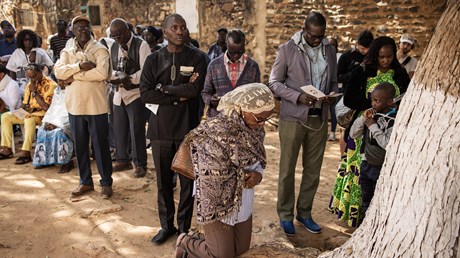 In Senegal, Muslims love to share meat. Christians share porridge.Ending the monthlong Ramadan fast this week, the faithful in the Muslim-majority West African nation invited Christian friends to celebrate Korite (Eid al-Fitr), focus on forgiveness and reconciliation, and share a wholesome meal of chicken.A little over two months later during Tabaski (Eid al-Adha), the mutton from sheep slaughtered in commemoration of Abraham’s sacrificing of his son will likewise be distributed to Christian neighbors. (Both feasts follow the lunar calendar and change dates each year.)But for Christians, the sign of interfaith unity is the porridge-like ngalakh.“Senegal is a country of terranga—‘hospitality’—and the sense of sharing is very high,” said Mignane Ndour, vice president of the Assemblies of God churches in Senegal. “Porridge has become our means of strengthening relations between Christians and Muslims.”Sources told CT the holiday treat is highly anticipated.In the local language, ngalakh means “to make porridge,” and the chilled dessert marks the end of Lent. Between 3 and 5 percent of Senegal’s 18 million people are Christians—the majority Catholic—and families gather to prepare the Easter fare on Good Friday.Made from peanut cream and monkey bread (the fruit of the famed baobab tree), these core ngalakh ingredients are soaked in water for over an hour before adding the millet flour necessary to thicken the paste. The dessert is then variously seasoned with nutmeg, orange blossom, pineapple, coconut, or raisins.Tangy and sweet yet savory, the porridge gets its brownish color from the peanut cream.The Christian community in Senegal traces its ...Continue reading... In Senegal, Muslims love to share meat. Christians share porridge.Ending the monthlong Ramadan fast this week, the faithful in the Muslim-majority West African nation invited Christian friends to celebrate Korite (Eid al-Fitr), focus on forgiveness and reconciliation, and share a wholesome meal of chicken.A little over two months later during Tabaski (Eid al-Adha), the mutton from sheep slaughtered in commemoration of Abraham’s sacrificing of his son will likewise be distributed to Christian neighbors. (Both feasts follow the lunar calendar and change dates each year.)But for Christians, the sign of interfaith unity is the porridge-like ngalakh.“Senegal is a country of terranga—‘hospitality’—and the sense of sharing is very high,” said Mignane Ndour, vice president of the Assemblies of God churches in Senegal. “Porridge has become our means of strengthening relations between Christians and Muslims.”Sources told CT the holiday treat is highly anticipated.In the local language, ngalakh means “to make porridge,” and the chilled dessert marks the end of Lent. Between 3 and 5 percent of Senegal’s 18 million people are Christians—the majority Catholic—and families gather to prepare the Easter fare on Good Friday.Made from peanut cream and monkey bread (the fruit of the famed baobab tree), these core ngalakh ingredients are soaked in water for over an hour before adding the millet flour necessary to thicken the paste. The dessert is then variously seasoned with nutmeg, orange blossom, pineapple, coconut, or raisins.Tangy and sweet yet savory, the porridge gets its brownish color from the peanut cream.The Christian community in Senegal traces its ...Continue reading... |
Hindutva ideology is crossing the border from India and making ministry more challenging for churches in the former Hindu kingdom.
 More than 15 years after Nepal officially became a secular democracy, the former Hindu monarchy may have a religious extremism problem, incited and aggravated by its closest neighbor.In an “alarming” development, Indian Hindutva ideology and politics have begun to spread throughout the country, as local experts and journalists report. This proliferation has resulted in a recent spate of attacks and restrictions on Christians reported within the country of 30 million.According to local sources, at least five separate incidents targeting Christians have been reported in March and April of this year.“The Hindu Swayamsevak Sangh (HSS) in Nepal is rapidly growing. Aiming to protect Hinduism, they degrade Christianity and badmouth us through social media and other sources,” said Kiran Thapa, who was arrested last month for praying for people in Kathmandu.In March, Thapa and several foreigners, all Christians, were visiting the Pashupatinath Temple, a religious World Heritage Site deeply venerated by local Hindus. When they entered the temple, they came across an elderly couple who were suffering with pain in their knees and back. The group offered to pray for them with the couple’s consent, and they subsequently reported that they were healed. More people then requested prayers from the group and reported being healed.“I had to request them to come one by one,” said Thapa.After two monks asked for prayer and then reported that they too had been healed of their physical afflictions, a policeman ordered the Christians to leave the Hindu temple for praying in Jesus' name. As they were leaving, a man with an immobile hand followed the group out. When the Christians prayed for him in the ...Continue reading... More than 15 years after Nepal officially became a secular democracy, the former Hindu monarchy may have a religious extremism problem, incited and aggravated by its closest neighbor.In an “alarming” development, Indian Hindutva ideology and politics have begun to spread throughout the country, as local experts and journalists report. This proliferation has resulted in a recent spate of attacks and restrictions on Christians reported within the country of 30 million.According to local sources, at least five separate incidents targeting Christians have been reported in March and April of this year.“The Hindu Swayamsevak Sangh (HSS) in Nepal is rapidly growing. Aiming to protect Hinduism, they degrade Christianity and badmouth us through social media and other sources,” said Kiran Thapa, who was arrested last month for praying for people in Kathmandu.In March, Thapa and several foreigners, all Christians, were visiting the Pashupatinath Temple, a religious World Heritage Site deeply venerated by local Hindus. When they entered the temple, they came across an elderly couple who were suffering with pain in their knees and back. The group offered to pray for them with the couple’s consent, and they subsequently reported that they were healed. More people then requested prayers from the group and reported being healed.“I had to request them to come one by one,” said Thapa.After two monks asked for prayer and then reported that they too had been healed of their physical afflictions, a policeman ordered the Christians to leave the Hindu temple for praying in Jesus' name. As they were leaving, a man with an immobile hand followed the group out. When the Christians prayed for him in the ...Continue reading... |
At 89 years old and more than 60 years into ministry, the Stonebriar Community Church founder plans to remain its primary preacher after the church names his successor.
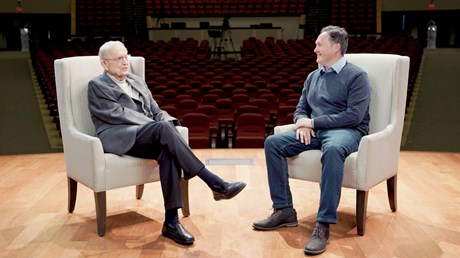 Chuck Swindoll has said that pastors “should never retire,” and the 89-year-old won’t be stepping away from the pulpit even as his church welcomes his successor.Stonebriar Community Church in Frisco, Texas, announced this week that Swindoll will transition to founding pastor, continuing to preach on Sundays, as Jonathan Murphy becomes its senior pastor on May 1.“This is a very unique way of expanding, of ‘moving into another chapter,’ as we often call it here,” said Swindoll in a video clip alongside Murphy, a Belfast-born preacher who currently serves as chair of pastoral ministries at Dallas Theological Seminary.With over 60 years in ministry, Swindoll is the oldest megachurch pastor in the country and one of the most influential. He has been vocal about his plans to remain active in ministry until his death.“One of my great goals in life is to live long enough to where I am in the pulpit, preaching my heart out, and I die on the spot, my chin hits the pulpit—boom!—and I’m down and out,” he said at age 75. “What a way to die.”In his new role, Swindoll remains Stonebriar’s regular preacher, while Murphy leads day-to-day ministries and fills in to preach when needed, according to the church’s announcement.“We have the founding pastor being able to continue to preach as long as the Lord would have, and I can have a season as a senior pastor taking responsibility for the staff and caring for them and the ministry direction of the church at large,” said Murphy, who has been a guest preacher at Stonebriar and serves on the board for Swindoll’s long-running radio ministry Insight for Living.The two have been preparing ...Continue reading... Chuck Swindoll has said that pastors “should never retire,” and the 89-year-old won’t be stepping away from the pulpit even as his church welcomes his successor.Stonebriar Community Church in Frisco, Texas, announced this week that Swindoll will transition to founding pastor, continuing to preach on Sundays, as Jonathan Murphy becomes its senior pastor on May 1.“This is a very unique way of expanding, of ‘moving into another chapter,’ as we often call it here,” said Swindoll in a video clip alongside Murphy, a Belfast-born preacher who currently serves as chair of pastoral ministries at Dallas Theological Seminary.With over 60 years in ministry, Swindoll is the oldest megachurch pastor in the country and one of the most influential. He has been vocal about his plans to remain active in ministry until his death.“One of my great goals in life is to live long enough to where I am in the pulpit, preaching my heart out, and I die on the spot, my chin hits the pulpit—boom!—and I’m down and out,” he said at age 75. “What a way to die.”In his new role, Swindoll remains Stonebriar’s regular preacher, while Murphy leads day-to-day ministries and fills in to preach when needed, according to the church’s announcement.“We have the founding pastor being able to continue to preach as long as the Lord would have, and I can have a season as a senior pastor taking responsibility for the staff and caring for them and the ministry direction of the church at large,” said Murphy, who has been a guest preacher at Stonebriar and serves on the board for Swindoll’s long-running radio ministry Insight for Living.The two have been preparing ...Continue reading... |
But experts say it can offer opportunities for leaders and congregations to grow.
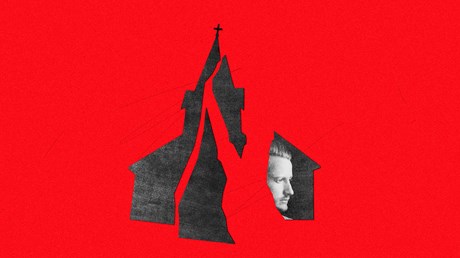 Conflict had become the norm at Trinity Church in Redlands, California.The lead pastor left in 2022 amid a wave of disgruntled attendees. Following his departure, some church members remained upset at the congregation’s elders. In all, there had been at least a dozen situations that came up over a 14-year period.When Doug Baker arrived as interim pastor, he knew the conflict had to be addressed. Trinity called in Peacemaker Ministries, a group that mediates conflicts from a biblical perspective. Over a weekend in March 2023, Peacemaker held 15 meetings with people embroiled in the church conflict, put together a plan, and peace began to emerge.Healing started. Many conflicts were resolved. Some people forgave. Some left the church. Trinity, which now averages 500 attendees in Sunday worship, began to change.The conflict resolution process revealed that the congregation didn’t feel as if the elders valued their opinions. The elders began to listen humbly, and they have kept listening. Two elders stand at the welcome booth each Sunday to hear people’s opinions about church matters. According to Baker, “conversations have opened back up.”The situation at Trinity has “been better—much, much better,” he said. “There is a peace. There is a graciousness, a unity, a love for each other and for the lost. People are reengaging with ministry. We are seeing specific ministries thriving a whole lot better because people are not worried about the struggle. They are more concerned about the kingdom.”According to church conflict researchers, Trinity illustrates some broader trends. Conflict often provokes pastors to leave their churches or at least consider leaving, researchers ...Continue reading... Conflict had become the norm at Trinity Church in Redlands, California.The lead pastor left in 2022 amid a wave of disgruntled attendees. Following his departure, some church members remained upset at the congregation’s elders. In all, there had been at least a dozen situations that came up over a 14-year period.When Doug Baker arrived as interim pastor, he knew the conflict had to be addressed. Trinity called in Peacemaker Ministries, a group that mediates conflicts from a biblical perspective. Over a weekend in March 2023, Peacemaker held 15 meetings with people embroiled in the church conflict, put together a plan, and peace began to emerge.Healing started. Many conflicts were resolved. Some people forgave. Some left the church. Trinity, which now averages 500 attendees in Sunday worship, began to change.The conflict resolution process revealed that the congregation didn’t feel as if the elders valued their opinions. The elders began to listen humbly, and they have kept listening. Two elders stand at the welcome booth each Sunday to hear people’s opinions about church matters. According to Baker, “conversations have opened back up.”The situation at Trinity has “been better—much, much better,” he said. “There is a peace. There is a graciousness, a unity, a love for each other and for the lost. People are reengaging with ministry. We are seeing specific ministries thriving a whole lot better because people are not worried about the struggle. They are more concerned about the kingdom.”According to church conflict researchers, Trinity illustrates some broader trends. Conflict often provokes pastors to leave their churches or at least consider leaving, researchers ...Continue reading... |
The founder of Concerned Women for America was credited by President Ronald Reagan with “changing the face of American politics.”
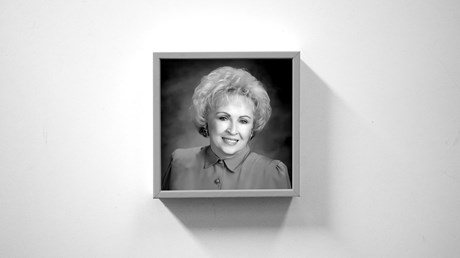 Beverly LaHaye, a timid pastor’s wife who became a fierce champion for conservative Christian politics and a force mobilizing hundreds of thousands of religious women, died on Sunday in a retirement home in El Cajon, California. She was 94.President Ronald Reagan once praised LaHaye as “one of the powerhouses” of the conservative movement and said she was “changing the face of American politics.”Paul Weyrich, the conservative activist who helped start The Heritage Foundation and coined the term moral majority, called the group LaHaye founded in 1979, the Concerned Women for America (CWA), the most effective organization on the Religious Right. He told CT in 1987 that the CWA had “the best follow-through” of any political group he’d ever worked with.At the height of LaHaye’s power, she could get the women she called “my ladies” to send more than 1,000 postcards to a US senator who had slighted her in a public hearing; 2,000 to support a Republican administration official who had been caught selling weapons illegally to Iran; 64,000 to support a controversial conservative candidate for the US Supreme Court; and 778,000 to protest a TV station that ran an advertisement for condoms during prime time.LaHaye “gave a lot of women a language for understanding women’s conservative activism as absolutely necessary,” historian Emily Suzanne Johnson told The Washington Post. “Women have been the driving force of this movement in a lot of ways, particularly at the grass-roots level. I’m not sure that happens without Beverly LaHaye.”Her success earned her the ire of those on the left, especially people concerned about LGBTQ rights. In ...Continue reading... Beverly LaHaye, a timid pastor’s wife who became a fierce champion for conservative Christian politics and a force mobilizing hundreds of thousands of religious women, died on Sunday in a retirement home in El Cajon, California. She was 94.President Ronald Reagan once praised LaHaye as “one of the powerhouses” of the conservative movement and said she was “changing the face of American politics.”Paul Weyrich, the conservative activist who helped start The Heritage Foundation and coined the term moral majority, called the group LaHaye founded in 1979, the Concerned Women for America (CWA), the most effective organization on the Religious Right. He told CT in 1987 that the CWA had “the best follow-through” of any political group he’d ever worked with.At the height of LaHaye’s power, she could get the women she called “my ladies” to send more than 1,000 postcards to a US senator who had slighted her in a public hearing; 2,000 to support a Republican administration official who had been caught selling weapons illegally to Iran; 64,000 to support a controversial conservative candidate for the US Supreme Court; and 778,000 to protest a TV station that ran an advertisement for condoms during prime time.LaHaye “gave a lot of women a language for understanding women’s conservative activism as absolutely necessary,” historian Emily Suzanne Johnson told The Washington Post. “Women have been the driving force of this movement in a lot of ways, particularly at the grass-roots level. I’m not sure that happens without Beverly LaHaye.”Her success earned her the ire of those on the left, especially people concerned about LGBTQ rights. In ...Continue reading... |
But experts say it can offer opportunities for leaders and congregations to grow.
 Conflict had become the norm at Trinity Church in Redlands, California.The lead pastor left in 2022 amid a wave of disgruntled attendees. Following his departure, some church members remained upset at the congregation’s elders. In all, there had been at least a dozen situations that came up over a 14-year period.When Doug Baker arrived as interim pastor, he knew the conflict had to be addressed. Trinity called in Peacemaker Ministries, a group that mediates conflicts from a biblical perspective. Over a weekend in March 2023, Peacemaker held 15 meetings with people embroiled in the church conflict, put together a plan, and peace began to emerge.Healing started. Many conflicts were resolved. Some people forgave. Some left the church. Trinity, which now averages 500 attendees in Sunday worship, began to change.The conflict resolution process revealed that the congregation didn’t feel as if the elders valued their opinions. The elders began to listen humbly, and they have kept listening. Two elders stand at the welcome booth each Sunday to hear people’s opinions about church matters. According to Baker, “conversations have opened back up.”The situation at Trinity has “been better—much, much better,” he said. “There is a peace. There is a graciousness, a unity, a love for each other and for the lost. People are reengaging with ministry. We are seeing specific ministries thriving a whole lot better because people are not worried about the struggle. They are more concerned about the kingdom.”According to church conflict researchers, Trinity illustrates some broader trends. Conflict often provokes pastors to leave their churches or at least consider leaving, researchers ...Continue reading... Conflict had become the norm at Trinity Church in Redlands, California.The lead pastor left in 2022 amid a wave of disgruntled attendees. Following his departure, some church members remained upset at the congregation’s elders. In all, there had been at least a dozen situations that came up over a 14-year period.When Doug Baker arrived as interim pastor, he knew the conflict had to be addressed. Trinity called in Peacemaker Ministries, a group that mediates conflicts from a biblical perspective. Over a weekend in March 2023, Peacemaker held 15 meetings with people embroiled in the church conflict, put together a plan, and peace began to emerge.Healing started. Many conflicts were resolved. Some people forgave. Some left the church. Trinity, which now averages 500 attendees in Sunday worship, began to change.The conflict resolution process revealed that the congregation didn’t feel as if the elders valued their opinions. The elders began to listen humbly, and they have kept listening. Two elders stand at the welcome booth each Sunday to hear people’s opinions about church matters. According to Baker, “conversations have opened back up.”The situation at Trinity has “been better—much, much better,” he said. “There is a peace. There is a graciousness, a unity, a love for each other and for the lost. People are reengaging with ministry. We are seeing specific ministries thriving a whole lot better because people are not worried about the struggle. They are more concerned about the kingdom.”According to church conflict researchers, Trinity illustrates some broader trends. Conflict often provokes pastors to leave their churches or at least consider leaving, researchers ...Continue reading... |
The founder of Concerned Women for America was credited by President Ronald Reagan with “changing the face of American politics.”
 Beverly LaHaye, a timid pastor’s wife who became a fierce champion for conservative Christian politics and a force mobilizing hundreds of thousands of religious women, died on Sunday in a retirement home in El Cajon, California. She was 94.President Ronald Reagan once praised LaHaye as “one of the powerhouses” of the conservative movement and said she was “changing the face of American politics.”Paul Weyrich, the conservative activist who helped start The Heritage Foundation and coined the term moral majority, called the group LaHaye founded in 1979, the Concerned Women for America (CWA), the most effective organization on the Religious Right. He told CT in 1987 that the CWA had “the best follow-through” of any political group he’d ever worked with.At the height of LaHaye’s power, she could get the women she called “my ladies” to send more than 1,000 postcards to a US senator who had slighted her in a public hearing; 2,000 to support a Republican administration official who had been caught selling weapons illegally to Iran; 64,000 to support a controversial conservative candidate for the US Supreme Court; and 778,000 to protest a TV station that ran an advertisement for condoms during prime time.LaHaye “gave a lot of women a language for understanding women’s conservative activism as absolutely necessary,” historian Emily Suzanne Johnson told The Washington Post. “Women have been the driving force of this movement in a lot of ways, particularly at the grass-roots level. I’m not sure that happens without Beverly LaHaye.”Her success earned her the ire of those on the left, especially people concerned about LGBTQ rights. In ...Continue reading... Beverly LaHaye, a timid pastor’s wife who became a fierce champion for conservative Christian politics and a force mobilizing hundreds of thousands of religious women, died on Sunday in a retirement home in El Cajon, California. She was 94.President Ronald Reagan once praised LaHaye as “one of the powerhouses” of the conservative movement and said she was “changing the face of American politics.”Paul Weyrich, the conservative activist who helped start The Heritage Foundation and coined the term moral majority, called the group LaHaye founded in 1979, the Concerned Women for America (CWA), the most effective organization on the Religious Right. He told CT in 1987 that the CWA had “the best follow-through” of any political group he’d ever worked with.At the height of LaHaye’s power, she could get the women she called “my ladies” to send more than 1,000 postcards to a US senator who had slighted her in a public hearing; 2,000 to support a Republican administration official who had been caught selling weapons illegally to Iran; 64,000 to support a controversial conservative candidate for the US Supreme Court; and 778,000 to protest a TV station that ran an advertisement for condoms during prime time.LaHaye “gave a lot of women a language for understanding women’s conservative activism as absolutely necessary,” historian Emily Suzanne Johnson told The Washington Post. “Women have been the driving force of this movement in a lot of ways, particularly at the grass-roots level. I’m not sure that happens without Beverly LaHaye.”Her success earned her the ire of those on the left, especially people concerned about LGBTQ rights. In ...Continue reading... |
At 89 years old and more than 60 years into ministry, the Stonebriar Community Church founder plans to remain its primary preacher after the church names his successor.
 Chuck Swindoll has said that pastors “should never retire,” and the 89-year-old won’t be stepping away from the pulpit even as his church welcomes his successor.Stonebriar Community Church in Frisco, Texas, announced this week that Swindoll will transition to founding pastor, continuing to preach on Sundays, as Jonathan Murphy becomes its senior pastor on May 1.“This is a very unique way of expanding, of ‘moving into another chapter,’ as we often call it here,” said Swindoll in a video clip alongside Murphy, a Belfast-born preacher who currently serves as chair of pastoral ministries at Dallas Theological Seminary.With over 60 years in ministry, Swindoll is the oldest megachurch pastor in the country and one of the most influential. He has been vocal about his plans to remain active in ministry until his death.“One of my great goals in life is to live long enough to where I am in the pulpit, preaching my heart out, and I die on the spot, my chin hits the pulpit—boom!—and I’m down and out,” he said at age 75. “What a way to die.”In his new role, Swindoll remains Stonebriar’s regular preacher, while Murphy leads day-to-day ministries and fills in to preach when needed, according to the church’s announcement.“We have the founding pastor being able to continue to preach as long as the Lord would have, and I can have a season as a senior pastor taking responsibility for the staff and caring for them and the ministry direction of the church at large,” said Murphy, who has been a guest preacher at Stonebriar and serves on the board for Swindoll’s long-running radio ministry Insight for Living.The two have been preparing ...Continue reading... Chuck Swindoll has said that pastors “should never retire,” and the 89-year-old won’t be stepping away from the pulpit even as his church welcomes his successor.Stonebriar Community Church in Frisco, Texas, announced this week that Swindoll will transition to founding pastor, continuing to preach on Sundays, as Jonathan Murphy becomes its senior pastor on May 1.“This is a very unique way of expanding, of ‘moving into another chapter,’ as we often call it here,” said Swindoll in a video clip alongside Murphy, a Belfast-born preacher who currently serves as chair of pastoral ministries at Dallas Theological Seminary.With over 60 years in ministry, Swindoll is the oldest megachurch pastor in the country and one of the most influential. He has been vocal about his plans to remain active in ministry until his death.“One of my great goals in life is to live long enough to where I am in the pulpit, preaching my heart out, and I die on the spot, my chin hits the pulpit—boom!—and I’m down and out,” he said at age 75. “What a way to die.”In his new role, Swindoll remains Stonebriar’s regular preacher, while Murphy leads day-to-day ministries and fills in to preach when needed, according to the church’s announcement.“We have the founding pastor being able to continue to preach as long as the Lord would have, and I can have a season as a senior pastor taking responsibility for the staff and caring for them and the ministry direction of the church at large,” said Murphy, who has been a guest preacher at Stonebriar and serves on the board for Swindoll’s long-running radio ministry Insight for Living.The two have been preparing ...Continue reading... |
Ngalakh combines baobab fruit and peanuts to end Easter in West African nation, reciprocated by the sharing of meat breaking Ramadan's fast.
 In Senegal, Muslims love to share meat. Christians share porridge.Ending the monthlong Ramadan fast this week, the faithful in the Muslim-majority West African nation invited Christian friends to celebrate Korite (Eid al-Fitr), focus on forgiveness and reconciliation, and share a wholesome meal of chicken.A little over two months later during Tabaski (Eid al-Adha), the mutton from sheep slaughtered in commemoration of Abraham’s sacrificing of his son will likewise be distributed to Christian neighbors. (Both feasts follow the lunar calendar and change dates each year.)But for Christians, the sign of interfaith unity is the porridge-like ngalakh.“Senegal is a country of terranga—‘hospitality’—and the sense of sharing is very high,” said Mignane Ndour, vice president of the Assemblies of God churches in Senegal. “Porridge has become our means of strengthening relations between Christians and Muslims.”Sources told CT the holiday treat is highly anticipated.In the local language, ngalakh means “to make porridge,” and the chilled dessert marks the end of Lent. Between 3 and 5 percent of Senegal’s 18 million people are Christians—the majority Catholic—and families gather to prepare the Easter fare on Good Friday.Made from peanut cream and monkey bread (the fruit of the famed baobab tree), these core ngalakh ingredients are soaked in water for over an hour before adding the millet flour necessary to thicken the paste. The dessert is then variously seasoned with nutmeg, orange blossom, pineapple, coconut, or raisins.Tangy and sweet yet savory, the porridge gets its brownish color from the peanut cream.The Christian community in Senegal traces its ...Continue reading... In Senegal, Muslims love to share meat. Christians share porridge.Ending the monthlong Ramadan fast this week, the faithful in the Muslim-majority West African nation invited Christian friends to celebrate Korite (Eid al-Fitr), focus on forgiveness and reconciliation, and share a wholesome meal of chicken.A little over two months later during Tabaski (Eid al-Adha), the mutton from sheep slaughtered in commemoration of Abraham’s sacrificing of his son will likewise be distributed to Christian neighbors. (Both feasts follow the lunar calendar and change dates each year.)But for Christians, the sign of interfaith unity is the porridge-like ngalakh.“Senegal is a country of terranga—‘hospitality’—and the sense of sharing is very high,” said Mignane Ndour, vice president of the Assemblies of God churches in Senegal. “Porridge has become our means of strengthening relations between Christians and Muslims.”Sources told CT the holiday treat is highly anticipated.In the local language, ngalakh means “to make porridge,” and the chilled dessert marks the end of Lent. Between 3 and 5 percent of Senegal’s 18 million people are Christians—the majority Catholic—and families gather to prepare the Easter fare on Good Friday.Made from peanut cream and monkey bread (the fruit of the famed baobab tree), these core ngalakh ingredients are soaked in water for over an hour before adding the millet flour necessary to thicken the paste. The dessert is then variously seasoned with nutmeg, orange blossom, pineapple, coconut, or raisins.Tangy and sweet yet savory, the porridge gets its brownish color from the peanut cream.The Christian community in Senegal traces its ...Continue reading... |
Hindutva ideology is crossing the border from India and making ministry more challenging for churches in the former Hindu kingdom.
 More than 15 years after Nepal officially became a secular democracy, the former Hindu monarchy may have a religious extremism problem, incited and aggravated by its closest neighbor.In an “alarming” development, Indian Hindutva ideology and politics have begun to spread throughout the country, as local experts and journalists report. This proliferation has resulted in a recent spate of attacks and restrictions on Christians reported within the country of 30 million.According to local sources, at least five separate incidents targeting Christians have been reported in March and April of this year.“The Hindu Swayamsevak Sangh (HSS) in Nepal is rapidly growing. Aiming to protect Hinduism, they degrade Christianity and badmouth us through social media and other sources,” said Kiran Thapa, who was arrested last month for praying for people in Kathmandu.In March, Thapa and several foreigners, all Christians, were visiting the Pashupatinath Temple, a religious World Heritage Site deeply venerated by local Hindus. When they entered the temple, they came across an elderly couple who were suffering with pain in their knees and back. The group offered to pray for them with the couple’s consent, and they subsequently reported that they were healed. More people then requested prayers from the group and reported being healed.“I had to request them to come one by one,” said Thapa.After two monks asked for prayer and then reported that they too had been healed of their physical afflictions, a policeman ordered the Christians to leave the Hindu temple for praying in Jesus' name. As they were leaving, a man with an immobile hand followed the group out. When the Christians prayed for him in the ...Continue reading... More than 15 years after Nepal officially became a secular democracy, the former Hindu monarchy may have a religious extremism problem, incited and aggravated by its closest neighbor.In an “alarming” development, Indian Hindutva ideology and politics have begun to spread throughout the country, as local experts and journalists report. This proliferation has resulted in a recent spate of attacks and restrictions on Christians reported within the country of 30 million.According to local sources, at least five separate incidents targeting Christians have been reported in March and April of this year.“The Hindu Swayamsevak Sangh (HSS) in Nepal is rapidly growing. Aiming to protect Hinduism, they degrade Christianity and badmouth us through social media and other sources,” said Kiran Thapa, who was arrested last month for praying for people in Kathmandu.In March, Thapa and several foreigners, all Christians, were visiting the Pashupatinath Temple, a religious World Heritage Site deeply venerated by local Hindus. When they entered the temple, they came across an elderly couple who were suffering with pain in their knees and back. The group offered to pray for them with the couple’s consent, and they subsequently reported that they were healed. More people then requested prayers from the group and reported being healed.“I had to request them to come one by one,” said Thapa.After two monks asked for prayer and then reported that they too had been healed of their physical afflictions, a policeman ordered the Christians to leave the Hindu temple for praying in Jesus' name. As they were leaving, a man with an immobile hand followed the group out. When the Christians prayed for him in the ...Continue reading... |
The American Solidarity Party is a small but growing alternative to the Trump-Biden race.
 Charlie Richert would really like to stop voting for his dad.But in the last couple presidential election cycles, the 30-year-old attorney in Indianapolis has been unable to square his conscience with picking either the Republican or Democratic party nominee, so he’s resorted to writing in a name.“There’s no way I can escape having my faith inform how I vote,” said Richert, a nondenominational Christian who grew up Republican. “Unfortunately, we’ve been kind of stuck in a doom loop of candidates at the presidential level that I’ve just not felt comfortable voting for.”This year, he’s not drawn to alternatives like Robert F. Kennedy Jr. or Cornel West. “Maybe I’ll write in Abe Lincoln this year. Sorry to my dad, but a new name to write in would be fun,” he said.He recalls seeking to convince his classmates in an eighth-grade mock election that they should support Mitt Romney, but his chagrin with the Republican Party’s presidential nominee tracked with the ascension of Donald Trump.In a year when both major party presidential candidates are viewed unfavorably by a quarter of Americans, many find themselves less excited about the two options at the top of the ticket. But, like Richert, that doesn’t mean they’re ready to go for third-party options.The third-party candidates running in 2024 span the ideological spectrum, from independents Kennedy and Princeton University professor Cornel West to Green Party candidate Jill Stein. Then there are the more obscure party or candidate options—the Prohibition Party, Andrew Yang’s Forward Party, Maryland politician Jason Palmer, and that man in Texas who changed his name to “Literally ...Continue reading... Charlie Richert would really like to stop voting for his dad.But in the last couple presidential election cycles, the 30-year-old attorney in Indianapolis has been unable to square his conscience with picking either the Republican or Democratic party nominee, so he’s resorted to writing in a name.“There’s no way I can escape having my faith inform how I vote,” said Richert, a nondenominational Christian who grew up Republican. “Unfortunately, we’ve been kind of stuck in a doom loop of candidates at the presidential level that I’ve just not felt comfortable voting for.”This year, he’s not drawn to alternatives like Robert F. Kennedy Jr. or Cornel West. “Maybe I’ll write in Abe Lincoln this year. Sorry to my dad, but a new name to write in would be fun,” he said.He recalls seeking to convince his classmates in an eighth-grade mock election that they should support Mitt Romney, but his chagrin with the Republican Party’s presidential nominee tracked with the ascension of Donald Trump.In a year when both major party presidential candidates are viewed unfavorably by a quarter of Americans, many find themselves less excited about the two options at the top of the ticket. But, like Richert, that doesn’t mean they’re ready to go for third-party options.The third-party candidates running in 2024 span the ideological spectrum, from independents Kennedy and Princeton University professor Cornel West to Green Party candidate Jill Stein. Then there are the more obscure party or candidate options—the Prohibition Party, Andrew Yang’s Forward Party, Maryland politician Jason Palmer, and that man in Texas who changed his name to “Literally ...Continue reading... |
Seminary leaders say that the country, where Baptists are the largest Protestant denomination, has lost hundreds of churches in the war with Russia.
 Southern Baptist leaders have written to US House Speaker Mike Johnson, a member and former official of their denomination, urging him to support Ukraine in Russia’s war against its Eastern European neighbor.“As you consider efforts to support Ukraine, we humbly ask that you consider the plight of Christians,” wrote the leaders, who either have ties to the SBC’s Southwestern Baptist Theological Seminary or to Ukrainian Baptists. “The Russian government’s decision to invade Ukraine and to target Baptists and other evangelical Christians in Ukraine has been a tragic hallmark of the war.”The letter, sent Monday, was signed by Daniel Darling, director of the seminary’s Land Center for Cultural Engagement; Richard Land, the namesake of the center and a former president of the Southern Baptist Convention’s Ethics and Religious Liberty Commission (ERLC); Yaroslav Pyzh, president of Ukrainian Baptist Theological Seminary; and Valerii Antoniu, president of the Baptist Union of Ukraine.Johnson is a former trustee of the ERLC, serving when Land—who also is a former commissioner of the US Commission on International Religious Freedom—was its president.In February, the Senate passed a $95 billion package for funding Ukraine, Israel and other allies, with $60 billion earmarked for Ukraine. But Johnson, whose tenure as House speaker may rely on his handling of the bill, has yet to schedule a House vote on the funding measure.Conservatives in the House who oppose funding for Ukraine on “America First” grounds, led by US Rep. Marjorie Taylor Greene of Georgia, have threatened to trigger a vote to remove Johnson from office.“Speaker Johnson has a really difficult ...Continue reading... Southern Baptist leaders have written to US House Speaker Mike Johnson, a member and former official of their denomination, urging him to support Ukraine in Russia’s war against its Eastern European neighbor.“As you consider efforts to support Ukraine, we humbly ask that you consider the plight of Christians,” wrote the leaders, who either have ties to the SBC’s Southwestern Baptist Theological Seminary or to Ukrainian Baptists. “The Russian government’s decision to invade Ukraine and to target Baptists and other evangelical Christians in Ukraine has been a tragic hallmark of the war.”The letter, sent Monday, was signed by Daniel Darling, director of the seminary’s Land Center for Cultural Engagement; Richard Land, the namesake of the center and a former president of the Southern Baptist Convention’s Ethics and Religious Liberty Commission (ERLC); Yaroslav Pyzh, president of Ukrainian Baptist Theological Seminary; and Valerii Antoniu, president of the Baptist Union of Ukraine.Johnson is a former trustee of the ERLC, serving when Land—who also is a former commissioner of the US Commission on International Religious Freedom—was its president.In February, the Senate passed a $95 billion package for funding Ukraine, Israel and other allies, with $60 billion earmarked for Ukraine. But Johnson, whose tenure as House speaker may rely on his handling of the bill, has yet to schedule a House vote on the funding measure.Conservatives in the House who oppose funding for Ukraine on “America First” grounds, led by US Rep. Marjorie Taylor Greene of Georgia, have threatened to trigger a vote to remove Johnson from office.“Speaker Johnson has a really difficult ...Continue reading... |
Get the most recent headlines and stories from Christianity Today delivered to your inbox daily.
|
As players face new pressures from bettors upset with their performance, chaplains in the NCAA are trying to help students remember their imago Dei.
 The odds are bringing little favor to college athletes, who are facing more pressure over their performance from bettors.South Carolina’s defeat of Iowa for the women’s NCAA championship on Sunday drew record-breaking betting numbers. BetMGM announced that the game had drawn the most bets of any women’s sporting event ever.Last year, bettors placed more than $15 billion in bets on the men’s college basketball tournament, according to the American Gaming Association. A major weight on players are prop bets, which are usually bets on details of an individual’s performance—like the number of rebounds from Iowa superstar Caitlin Clark.The NCAA estimates that a third of student athletes have been harassed by bettors. It has raised alarms and now is examining how betting and social media more broadly affect student athletes’ wellbeing.“Indirectly, I think players notice that. They may hear it from a fan walking off the court,” said Roger Lipe, who ministers to college coaches and players through Nations of Coaches and is chaplain for the Southern Illinois University men’s basketball team. Lipe was at the Final Four women’s games over the weekend and the concurrent coach’s conference in Cleveland, Ohio.In his 30 years of ministry, a conversation on gambling was often a part of preseason meetings. Betting on sports has been happening for a long time, legal or not, Lipe pointed out.But the legalization of mobile sports betting in states across the country means that it’s much easier for fans to bet, and less taboo. Chaplains have to adapt, Lipe said.In his work, Lipe does book studies with coaching staff, goes to practices, and prays with anyone before ...Continue reading... The odds are bringing little favor to college athletes, who are facing more pressure over their performance from bettors.South Carolina’s defeat of Iowa for the women’s NCAA championship on Sunday drew record-breaking betting numbers. BetMGM announced that the game had drawn the most bets of any women’s sporting event ever.Last year, bettors placed more than $15 billion in bets on the men’s college basketball tournament, according to the American Gaming Association. A major weight on players are prop bets, which are usually bets on details of an individual’s performance—like the number of rebounds from Iowa superstar Caitlin Clark.The NCAA estimates that a third of student athletes have been harassed by bettors. It has raised alarms and now is examining how betting and social media more broadly affect student athletes’ wellbeing.“Indirectly, I think players notice that. They may hear it from a fan walking off the court,” said Roger Lipe, who ministers to college coaches and players through Nations of Coaches and is chaplain for the Southern Illinois University men’s basketball team. Lipe was at the Final Four women’s games over the weekend and the concurrent coach’s conference in Cleveland, Ohio.In his 30 years of ministry, a conversation on gambling was often a part of preseason meetings. Betting on sports has been happening for a long time, legal or not, Lipe pointed out.But the legalization of mobile sports betting in states across the country means that it’s much easier for fans to bet, and less taboo. Chaplains have to adapt, Lipe said.In his work, Lipe does book studies with coaching staff, goes to practices, and prays with anyone before ...Continue reading... |
“We're not being political. We're just trying to get you what you need.”
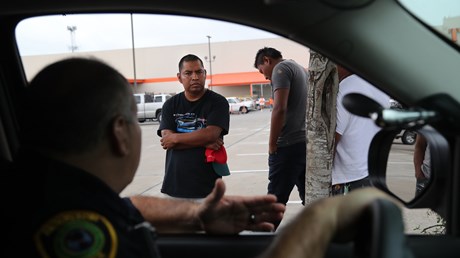 Palm Sunday looked different this year for a small majority-immigrant church in Fort Worth. For part of the service, the pastors invited an immigration lawyer to speak about what to expect if Texas enacts a new law that authorizes the state to arrest and deport migrants.“There is a lot of fear in our church in regard to this law and a lot of uncertainty. … What does it mean? How does it affect their cases?” asked Anyra Cano, one of the pastors.The congregation, mostly first-generation immigrants from Latin America, “knows they can come to us when they have those kinds of questions,” she added.Texas’ Senate Bill 4 (SB 4) comes as the latest salvo amid long-standing tensions between Republican Gov. Greg Abbott and the Biden administration over the nation’s immigration enforcement.Last year, over 2.4 million people sought to cross the US-Mexico border. Texas (like other Republican-governed states) has tried to respond by taking matters into its own hands. Abbott signed SB 4 into law in December, making illegal border-crossing not just a federal offense but a state crime.Currently, the bill is tied up in court—a federal appeals court ruled Wednesday that SB 4 will remain on hold.The law would allow Texas police to question and detain anyone they suspect of illegally crossing the US-Mexico border. Though SB 4 doesn’t allow arrests in schools, places of worship, or health care facilities, even the possibility of brushes with police officers with deportation power has raised concerns for immigrant communities in Texas—and for the Christian leaders who serve them.Many of the attendees at Cano’s church do have some kind of status, albeit perhaps not a more permanent ...Continue reading... Palm Sunday looked different this year for a small majority-immigrant church in Fort Worth. For part of the service, the pastors invited an immigration lawyer to speak about what to expect if Texas enacts a new law that authorizes the state to arrest and deport migrants.“There is a lot of fear in our church in regard to this law and a lot of uncertainty. … What does it mean? How does it affect their cases?” asked Anyra Cano, one of the pastors.The congregation, mostly first-generation immigrants from Latin America, “knows they can come to us when they have those kinds of questions,” she added.Texas’ Senate Bill 4 (SB 4) comes as the latest salvo amid long-standing tensions between Republican Gov. Greg Abbott and the Biden administration over the nation’s immigration enforcement.Last year, over 2.4 million people sought to cross the US-Mexico border. Texas (like other Republican-governed states) has tried to respond by taking matters into its own hands. Abbott signed SB 4 into law in December, making illegal border-crossing not just a federal offense but a state crime.Currently, the bill is tied up in court—a federal appeals court ruled Wednesday that SB 4 will remain on hold.The law would allow Texas police to question and detain anyone they suspect of illegally crossing the US-Mexico border. Though SB 4 doesn’t allow arrests in schools, places of worship, or health care facilities, even the possibility of brushes with police officers with deportation power has raised concerns for immigrant communities in Texas—and for the Christian leaders who serve them.Many of the attendees at Cano’s church do have some kind of status, albeit perhaps not a more permanent ...Continue reading... |
On an island where Buddhist disaster relief is prominent, Christians work with churches to care for children and families.
 When a 7.4 magnitude earthquake hit the east coast of Taiwan Wednesday morning, Carissa Wang, branding communication director of World Vision Taiwan, was on the Taipei subway on her way to work. She felt the carriage sway more than usual, and then it stopped at the next station as an announcement alerted passengers that service had ended due to an earthquake.Wang and her World Vision colleagues immediately began putting disaster relief protocols into action, assembling their emergency team and reaching out to local government officials to coordinate relief at evacuation centers. World Vision social workers also began to contact the 3,000 sponsored children and their families in the epicenter of Hualien to make sure they were safe and find out if they needed help.Wednesday’s quake was the worst to hit Taiwan in 25 years, damaging buildings and causing landslides. Images from Hualien, a city on the country’s east coast, showed a red brick building leaning at a 45-degree angle after its first floor collapsed. Large rocks tumbled down the side of mountains and blocked roads into the tourist destination of Taroko Gorge, trapping people at a hotel.Yet Hualien sustained surprisingly little damage for an earthquake of such magnitude. As of Monday, 13 people had died, and only one of them was killed due to building damage. Most of the others were hit by falling rocks. Ten people are still missing and more than 1,000 were injured.The low loss of life is attributed to Taiwan’s earthquake preparedness, as the government improved and reinforced building codes after a deadly earthquake in 1999 killed 2,400 people. Public education on earthquakes is widespread, and disaster relief groups are well-trained and respond quickly. ...Continue reading... When a 7.4 magnitude earthquake hit the east coast of Taiwan Wednesday morning, Carissa Wang, branding communication director of World Vision Taiwan, was on the Taipei subway on her way to work. She felt the carriage sway more than usual, and then it stopped at the next station as an announcement alerted passengers that service had ended due to an earthquake.Wang and her World Vision colleagues immediately began putting disaster relief protocols into action, assembling their emergency team and reaching out to local government officials to coordinate relief at evacuation centers. World Vision social workers also began to contact the 3,000 sponsored children and their families in the epicenter of Hualien to make sure they were safe and find out if they needed help.Wednesday’s quake was the worst to hit Taiwan in 25 years, damaging buildings and causing landslides. Images from Hualien, a city on the country’s east coast, showed a red brick building leaning at a 45-degree angle after its first floor collapsed. Large rocks tumbled down the side of mountains and blocked roads into the tourist destination of Taroko Gorge, trapping people at a hotel.Yet Hualien sustained surprisingly little damage for an earthquake of such magnitude. As of Monday, 13 people had died, and only one of them was killed due to building damage. Most of the others were hit by falling rocks. Ten people are still missing and more than 1,000 were injured.The low loss of life is attributed to Taiwan’s earthquake preparedness, as the government improved and reinforced building codes after a deadly earthquake in 1999 killed 2,400 people. Public education on earthquakes is widespread, and disaster relief groups are well-trained and respond quickly. ...Continue reading... |
His Pentecostalism put him at odds with many but the Deliverance Church founder stood firm in his convictions “to bring back the glory of God back to the Church in these last days.”
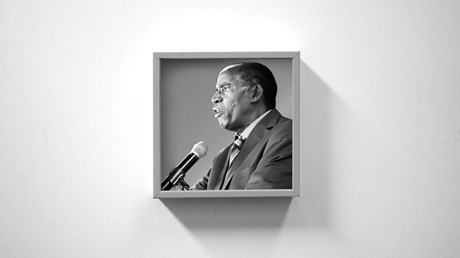 Joe Kayo, known by many as the father of the Pentecostal-Charismatic movement in East Africa, died on November 2, 2023. He was 86.Kayo founded churches in four countries: Deliverance Church Kenya, Deliverance Church Uganda, Juba Pentecostal Church in South Sudan, and Family of God Churches of Zimbabwe. At the time of his death, he was leading the Christian Family Church in Nairobi.Kayo described his ministry as a place “where the power of God is seen working with tangible manifestations, to bring back the glory of God back to the Church in these last days.”Kayo embraced his spiritual calling as African nations were gaining independence from their European colonizers. His vision of creating churches, led and financed by Africans, that contextualized the Christian faith within African culture caught fire throughout East Africa. It also was at odds with many of the churches that traced their roots back to Western missions and with which he tangled frequently over worship styles and the presence of the Holy Spirit.“This is the man God used to break barriers and rocks that stood in front of the charismatic movement and Pentecostalism in East Africa,” said J. B. Masinde, a bishop at a Nairobi congregation Kayo had founded, in 2019. “He paid a price … this man carries scars that some of you will never understand in your life.”The eldest of six children, Joseph Kayo Nyakango was born in Nyamira County, western Kenya on May 5, 1937. When he was 12, his mother died, and he dropped out of school prematurely due to lack of school fees. In despair, Kayo sank into drug abuse and petty crime. Later in life, he would narrate how he attempted to take his own life three times without success.More ...Continue reading... Joe Kayo, known by many as the father of the Pentecostal-Charismatic movement in East Africa, died on November 2, 2023. He was 86.Kayo founded churches in four countries: Deliverance Church Kenya, Deliverance Church Uganda, Juba Pentecostal Church in South Sudan, and Family of God Churches of Zimbabwe. At the time of his death, he was leading the Christian Family Church in Nairobi.Kayo described his ministry as a place “where the power of God is seen working with tangible manifestations, to bring back the glory of God back to the Church in these last days.”Kayo embraced his spiritual calling as African nations were gaining independence from their European colonizers. His vision of creating churches, led and financed by Africans, that contextualized the Christian faith within African culture caught fire throughout East Africa. It also was at odds with many of the churches that traced their roots back to Western missions and with which he tangled frequently over worship styles and the presence of the Holy Spirit.“This is the man God used to break barriers and rocks that stood in front of the charismatic movement and Pentecostalism in East Africa,” said J. B. Masinde, a bishop at a Nairobi congregation Kayo had founded, in 2019. “He paid a price … this man carries scars that some of you will never understand in your life.”The eldest of six children, Joseph Kayo Nyakango was born in Nyamira County, western Kenya on May 5, 1937. When he was 12, his mother died, and he dropped out of school prematurely due to lack of school fees. In despair, Kayo sank into drug abuse and petty crime. Later in life, he would narrate how he attempted to take his own life three times without success.More ...Continue reading... |
Pastors and religious liberty advocates worry the government's effort to manage religion will bring tighter control.
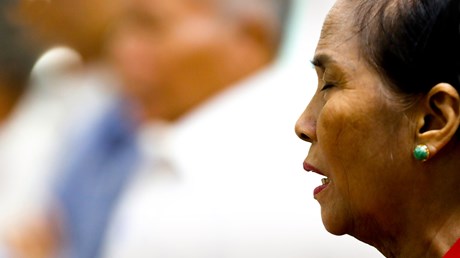 Operating a church in Vietnam just became even more difficult thanks to new government regulations that went into effect over the weekend. Under Decree 95, the government will now require religious groups to submit financial records and allow local government officials to suspend religious activities for unspecified “serious violations.”Nguyen Ti Dinh of Vietnam’s religious affairs committee said the guidelines will improve how the government manages religion by implementing uniform measures for the 2018 Law on Belief and Religion, which requires religious groups to register with the government. Observers believe the decree is Vietnam’s attempt to demonstrate to the international community that it is trying to increase religious liberty and to get off the US State Department’s Special Watch List for countries engaged in religious freedom violations.Yet religious liberty advocates and local church leaders believe the new rules will do the opposite. Instead of making it easier to register churches, the government is requiring more oversight and control. If the Vietnamese government is trying to show the international community that it is serious about religious freedom, noted Hien Vu, Vietnam program manager of the Institute for Global Engagement (IGE), it needs to explain how the new policy would achieve that.“With this decree, it’s like Vietnam shot themselves in the foot,” Vu said.The Southeast Asian country, where Christians make up 8 percent of the population, is ranked No. 35 in the Open Doors’ list of most difficult countries to be a Christian. While Christians can worship freely in bigger cities, believers among ethnic minority groups and in rural areas still face ...Continue reading... Operating a church in Vietnam just became even more difficult thanks to new government regulations that went into effect over the weekend. Under Decree 95, the government will now require religious groups to submit financial records and allow local government officials to suspend religious activities for unspecified “serious violations.”Nguyen Ti Dinh of Vietnam’s religious affairs committee said the guidelines will improve how the government manages religion by implementing uniform measures for the 2018 Law on Belief and Religion, which requires religious groups to register with the government. Observers believe the decree is Vietnam’s attempt to demonstrate to the international community that it is trying to increase religious liberty and to get off the US State Department’s Special Watch List for countries engaged in religious freedom violations.Yet religious liberty advocates and local church leaders believe the new rules will do the opposite. Instead of making it easier to register churches, the government is requiring more oversight and control. If the Vietnamese government is trying to show the international community that it is serious about religious freedom, noted Hien Vu, Vietnam program manager of the Institute for Global Engagement (IGE), it needs to explain how the new policy would achieve that.“With this decree, it’s like Vietnam shot themselves in the foot,” Vu said.The Southeast Asian country, where Christians make up 8 percent of the population, is ranked No. 35 in the Open Doors’ list of most difficult countries to be a Christian. While Christians can worship freely in bigger cities, believers among ethnic minority groups and in rural areas still face ...Continue reading... |
Statistics reveal that three out of ten women in the country have experienced abuse at some point in their lives. Theologians and leaders weigh on how to turn churches into safe places for them.
 For too many Brazilian women abused by their spouses, the answer church leaders have given to their suffering is Ephesians 5:22: “Wives, submit yourselves to your own husbands.”“It’s the cruelest phrase in the Bible,” one woman told journalist Marília de Camargo César, as she records in O Grito de Eva (Eve’s Cry). “[Church leaders] teach it in a twisted way, without taking into account the historical context, traditions, culture,” she explains, identified in the book only as Professor Regina.Three out of ten Brazilian women suffer domestic violence at some point in their lives. The country has high rates of violence against women, ranking fifth in the world. Last year, a national hotline received calls from an average of 245 women each day reporting some kind of violence. All this in a nation where women comprise m ore than half (58%) of evangelicals.Recent allegations of abuse in North American churches have generated discussion in the Brazilian church around the issue, but churches and denominations have standard procedures or adopted best practices for addressing domestic violence. Yet in an environment where many survivors don’t report violence because of shame and fear of retaliation, evangelical churches have the opportunity to be places of shelter and guidance for hurting women.Given these realities, CT invited six evangelical leaders who are experts on the subject to answer the following question: “What should church leaders do when a female congregant says she has been a victim of abuse or violence?”Answers have been edited for clarity and style.Continue reading... For too many Brazilian women abused by their spouses, the answer church leaders have given to their suffering is Ephesians 5:22: “Wives, submit yourselves to your own husbands.”“It’s the cruelest phrase in the Bible,” one woman told journalist Marília de Camargo César, as she records in O Grito de Eva (Eve’s Cry). “[Church leaders] teach it in a twisted way, without taking into account the historical context, traditions, culture,” she explains, identified in the book only as Professor Regina.Three out of ten Brazilian women suffer domestic violence at some point in their lives. The country has high rates of violence against women, ranking fifth in the world. Last year, a national hotline received calls from an average of 245 women each day reporting some kind of violence. All this in a nation where women comprise m ore than half (58%) of evangelicals.Recent allegations of abuse in North American churches have generated discussion in the Brazilian church around the issue, but churches and denominations have standard procedures or adopted best practices for addressing domestic violence. Yet in an environment where many survivors don’t report violence because of shame and fear of retaliation, evangelical churches have the opportunity to be places of shelter and guidance for hurting women.Given these realities, CT invited six evangelical leaders who are experts on the subject to answer the following question: “What should church leaders do when a female congregant says she has been a victim of abuse or violence?”Answers have been edited for clarity and style.Continue reading... |



 Links
Links  Articles
Articles  Blogs
Blogs  Videos
Videos  News
News  Colors
Colors 

 New links
New links

